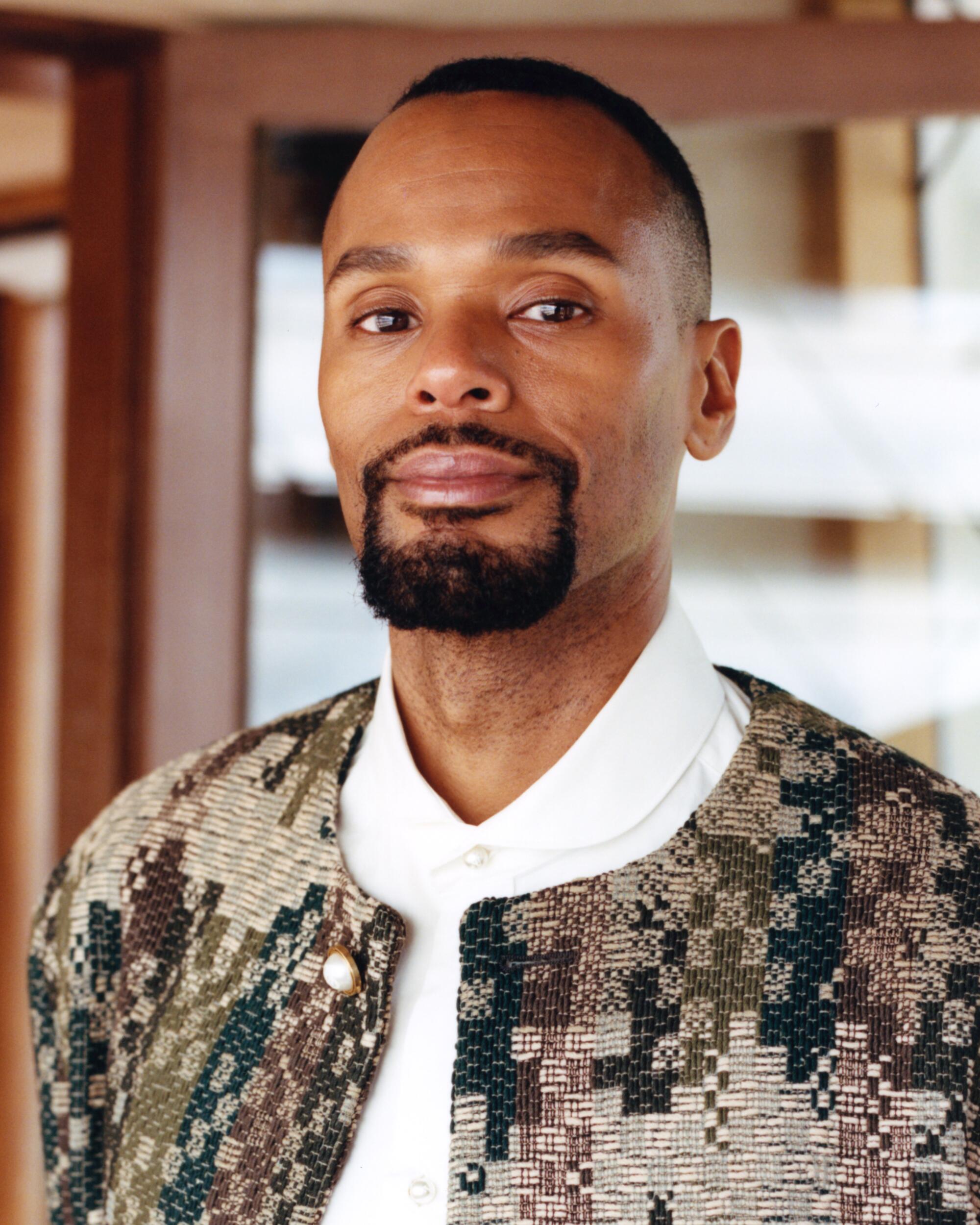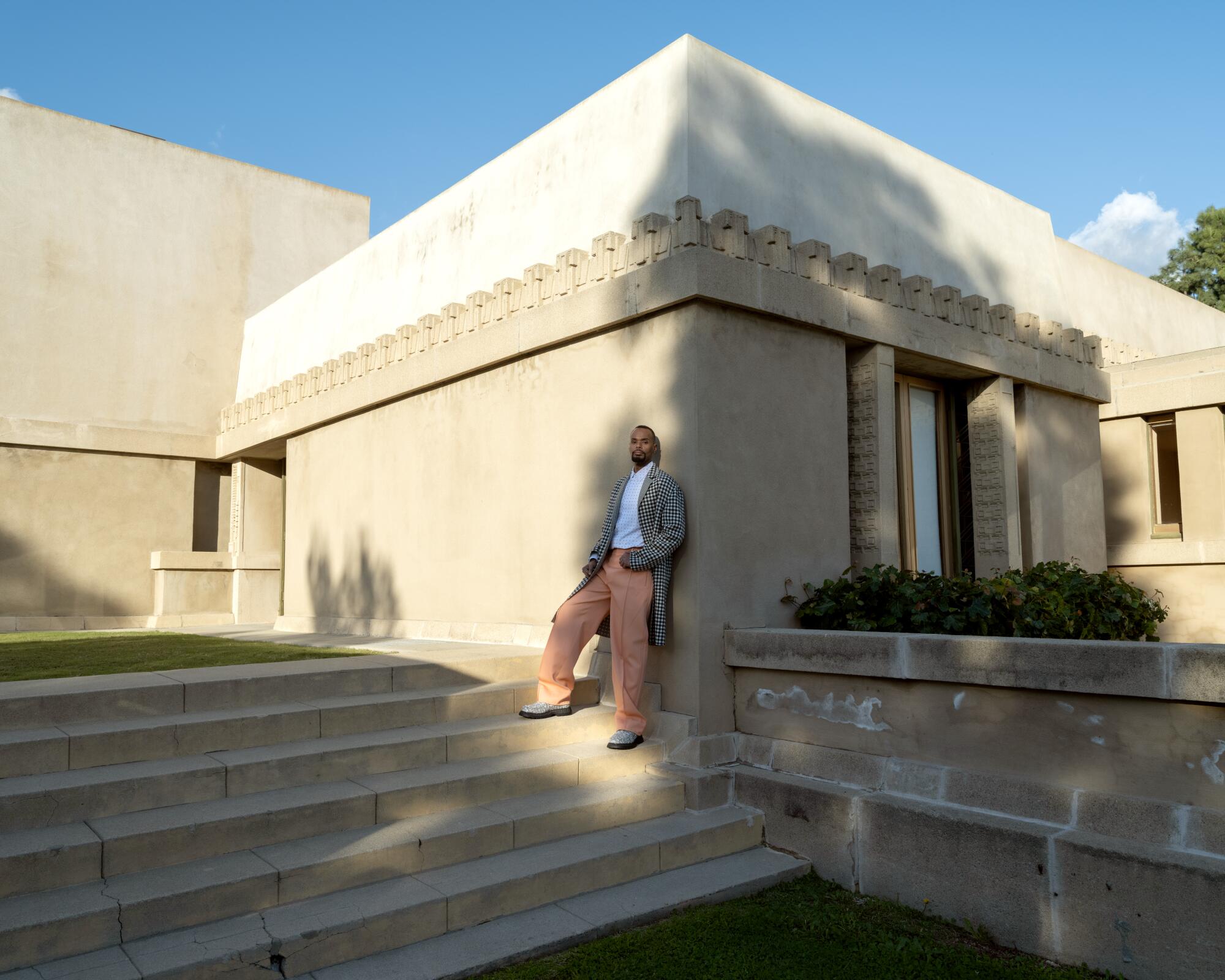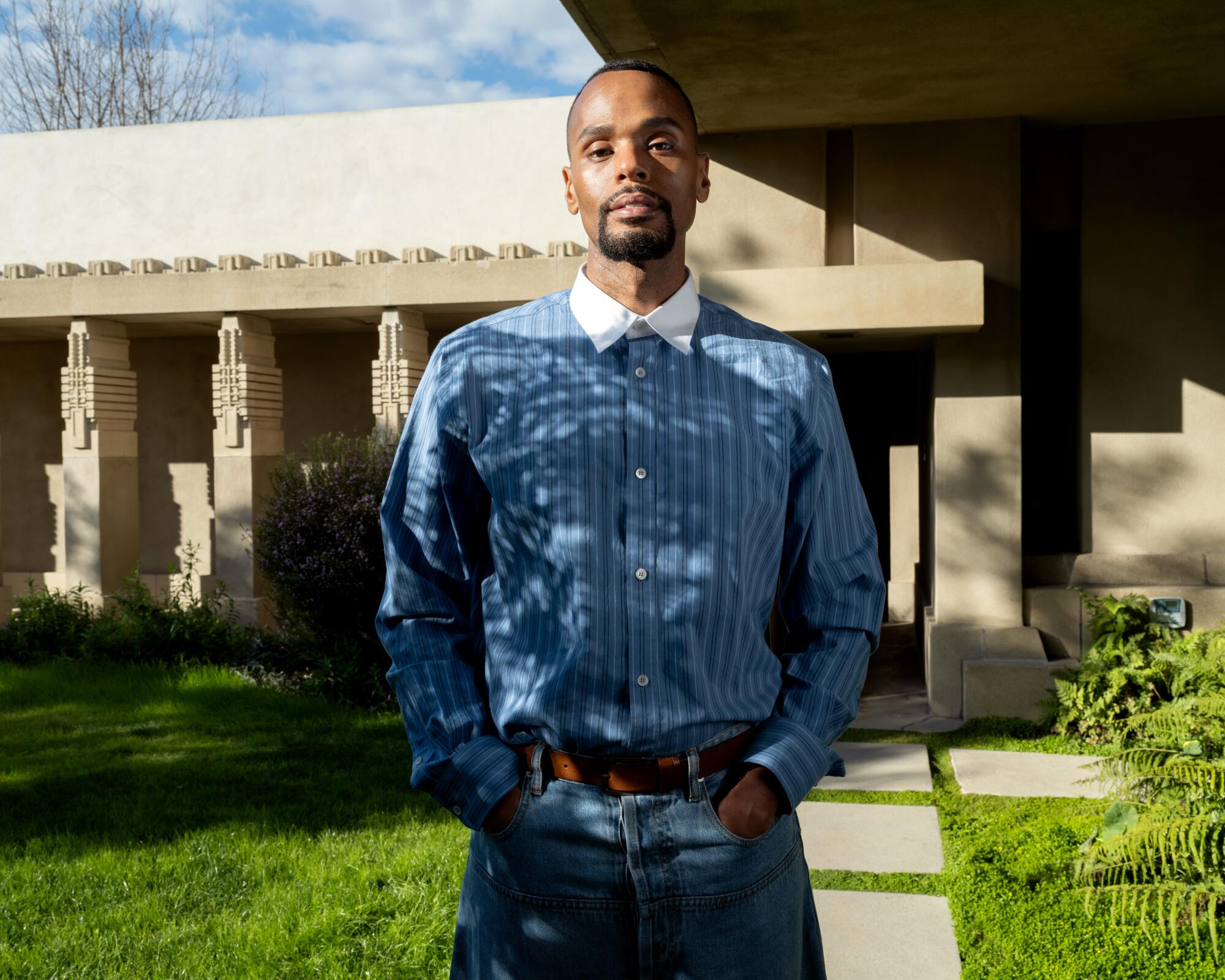
Michael Arceneaux at the Hollyhock House. Arceneaux wears Loewe shirt, Isabel Marant denim jeans and jacket, Louis Vuitton shoes, Akoni glasses.
(Gabriel S. Lopez/For The Times)
Forty-eight hours of torrential downpour betray the natural logic of Los Angeles. Submerged roadways, mudslides and record-setting rainfall have transformed the Southland city into an obstacle course out of the apocalypse, the very scene you’d see in a movie before everything goes full dystopia. Withstanding extreme conditions is nothing new for Michael Arceneaux, who has made a career out of navigating unstable ground. Today is just another Wednesday.
As we sit to talk on the balcony of his Koreatown apartment, seven stories up, the rain has finally stopped despite a procession of chubby gray clouds that hang like prop art in the sky, threatening to disrupt what momentary peace we’ve found. For now the storm is over. The context is appropriate given what Arceneaux, 39, has faced in the last year, losing his mother to cancer in October. And a close friend before that. “I am in my sad boy era,” he jokes.
I want to tell him that storms don’t last forever but people in the midst of intense grief don’t need cheesy Hallmark cliches. Instead, I promise to listen and be there for him. It has been a great fortune of mine to call Michael a friend since 2004. The orbit of our friendship began that summer, before either of us made it as writers, and what I knew of him then is even more vivid and electric now: He is as genuine, witty and insightful as they come.
“Grief is just a really uncomfortable subject.”
— Michael Arceneaux
Michael grew up the middle child in a subdivision of Houston named Windsor Village. He attended Howard University, where he studied broadcast journalism, and later started the Cynical Ones, a blog that earned him the reputation as an original voice on matters of race, politics and pop culture. He’s written for just about everybody — the Washington Post, Rolling Stone, the New York Times, Ebony, Essence — and is currently developing a TV series inspired by his first memoir of essays.
Michael’s latest book, “I Finally Bought Some Jordans” (out March 12), is a profoundly felt coda to his “I” trilogy, which began in 2018 with “I Can’t Date Jesus,” a New York Times bestseller, and was followed by “I Don’t Want to Die Poor” in 2020, an essay collection about debt and shame. “Jordans” is a noticeable detour from those previous offerings — its centerpiece is grief.
Through a series of serpentine encounters, touring from New York City to Houston to L.A., with the COVID-19 pandemic as its backdrop, the book addresses millennial angst and its many challenges. Throughout, Michael prevails as his characteristically funny self, scrutinizing au courant artwork (on “Slave Play”: “It makes you think. Much of what I thought throughout the play was, What the f—?”) while learning to find joy in middle age and local Tex-Mex delicacies, like the crab nachos from Cyclone Anaya’s, a beloved Houston eatery.
Still, the reality of what he’s weathered can’t be avoided. “Grief is just a really uncomfortable subject.” He tells me he didn’t want to avoid it. That he couldn’t. That he had to write about it. Write through it. So that’s exactly what he did.
Jason Parham: Prepping for the interview I realized it’s been 20 years, this year, that we’ve known each other.
Michael Arceneaux: It has.
JP: I’ve always admired how gracious you are when greeting folks. So I’d like to begin where you always begin with me. How are you?
MA: I’m actually having a really difficult time. Last year was the worst year of my life. I’m really deep in grief. But I have no choice but to pull it together to an extent because I don’t want this [book] to fail. And I don’t want to fail.

Arceneaux’s latest book, “I Finally Bought Some Jordans” (out March 12), is a profoundly felt coda to his “I” trilogy. Arceneaux wears Louis Vuitton shirt, trousers, jacket.
(Gabriel S. Lopez/For The Times)
JP: I wouldn’t call three books a failure.
MA: No. But I always worried about how Zora Neale Hurston died poor. If not for Alice Walker, literally all of her work would be lost. And that’s the case for a lot of Black writers and creatives. Not to be overly cynical — and this was something I told my mom because it was how I felt — I’m like, ‘I would probably be more valuable dead than alive.’ In my mind I already know how that goes, and it’s very true of a lot of people.
JP: Too many people.
MA: The point of the book is, I thought I would be in a certain place. I’ve made some strides that I’m happy with, but it’s not exactly what I thought it would be. And a lot of that stuff is beyond my control. That’s always been the case. It’s about accepting that. I’m very self-critical, and while I don’t want to value my work solely by monetary meaning, it’s hard to ignore that no matter how successful you’ve been or appear to be.
It’s a hard time to be a creative. There’s a real devaluing of what I do for a living. It’s unsettling. The [Hollywood writers] strike was really painful. Last year, like a lot of people, I felt it. It didn’t matter what level you were at — especially if you were Black. The discomfort is a wake-up call.
JP: It’s so different from when we started. You created a blog in 2005, the Cynical Ones. Are you nostalgic at all for that time in media?
MA: I wouldn’t say nostalgic. Something I wrestle with is that my writing and my pursuits kept me away from my mom. Ultimately I have to find my way and see things through. I’m not the first person to say this, but I’m learning in grief that I am a different person after losing her. Part of that is rediscovering an actual love of writing. This is a roundabout way of saying maybe I should do a newsletter. Maybe it can be something I play with. Because I started a blog to find my voice and get better as a writer. Samantha Irby has told me to do one forever. She has one where she does Judge Mathis recaps.
JP: Wait, really?
MA: Yes, it’s hilarious. I highly recommend it. Clearly I have a lot of complaints, but I still want to enjoy this. I didn’t put so much work and effort into this to not enjoy it. So much of what my ambition was rooted in is now a reward that can’t be given. It’s become, ‘How can I continue to enjoy what I’m writing?’
JP: That’s important.
MA: I don’t say this arrogantly, but anybody that’s both Black and queer, being pioneering is exhausting. You’re constantly having to change people’s perceptions. And in this climate it’s harder than ever.
JP: Rarely is Black art allowed to just exist.
“I’m not the first person to say this, but I’m learning in grief that I am a different person after losing her.”
— Michael Arceneaux
MA: I get the critique about that. Unfortunately, we live in the world as is and not how we want it to be. But if you very much stick to your voice and commit to it, all of that will shine through. I always remember how hard it was to get “I Can’t Date Jesus” published because everything mirrors that process, in that people have very limited ideas of what they think queer means, what gay means, what Black means, how that presents, what that sounds like. I hear the dumbest things. The same things I heard in publishing I hear even worse in television, even if it’s delivered with a smile. I’m exhausted from dealing with people’s prejudice.
JP: Was writing always your path?
MA: I was pushed into freelancing. I’m disappointed more writers are being pushed into it because people who don’t know what they’re doing are running companies into the ground, and everybody else is left to deal with it. A lot of the lamenting I’ve seen for media this year, I didn’t see that for all the Black media that was decimated a decade ago. And it doesn’t make what’s going on now any less awful, but it’s been an obvious problem for a while.
JP: You wrestle with that sentiment quite beautifully in the book, the difficulty in shouldering collective grief — what’s happening in the world — alongside private grief.
MA: I was very adamant during the promotion of my first book — because I felt it already happening — about not being boxed in. I didn’t want to be that sad gay person. I didn’t want to perpetuate certain tropes. Not that I carry that burden but it was in the back of my mind. That said, initially I had an idea of what I wanted the most recent book to be when I had a different title. Then life happened. It forced me to be more honest about how I felt, even about things I thought were settled. Clearly a block was there.
When I told my mom about the book, she said, ‘You’re angry.’ I didn’t think so, but I did recognize that there were unresolved feelings from my childhood. Now it’s become about accepting that some things won’t change. You won’t necessarily get that happy ending. I intended for this trio of books to end on a brighter note as I enter middle age, but life doesn’t work that way. Look at what’s happening around us.
JP: But I think the book is more relatable that way. More human. Life takes a curve; sure, it’s not what you expected, but you do your best to find hope and humor in the darkness. And maybe that hope takes the form of a haircut. You write about how getting a cut was a small way of regaining control. We’re the same in that we believe in the restorative power of a fade. There’s almost nothing that a fresh cut can’t fix, even if only momentarily.

“I was very adamant during the promotion of my first book — because I felt it already happening — about not being boxed in,” says Arceneaux. The writer stands outside the Hollyhock House, wearing Dior Men’s shirt and shoes, Zegna trousers, Canali coat.
(Gabriel S. Lopez/For The Times)
MA: There are people whose lives were destroyed when the plague happened and I want to acknowledge that. I worked really hard to make the first book happen. Going into the second book, it was about trying to get over life’s humps. Overall I was still fortunate that year. But I was struggling in the apartment I was in, in such a small space. I was alone. I’m not with my family. I don’t know what’s going on. I’d already experienced COVID, so I knew what it felt like.
The second book wasn’t the most important thing but I wanted it to reach people. I couldn’t do it at my best so I wanted something that I could have — and that was getting a cut up the street. It’s very vain and small, but other people were being much more selfish than I was. Catholic guilt is forever. A little bit of me was like, I’m triflin’ but not as triflin’. I wanted to feel like a bad bitch, and that’s the best I could get in such a dire situation.
JP: In one essay, you dig into the political elite — Barack Obama, Pete Buttigieg, Joe Biden, Eric Adams — and the limits of symbolism. How representation for the sake of representation doesn’t generate progress in the way some people seem to think, and how minorities bear the disproportionate brunt of their failures. November is around the corner. How f—ed are we?
MA: I don’t really believe in polling but I did see that even if Trump is convicted he is still within the margin of error. It’s an old man and a criminal. I’m trying to not be disparaging. They’re both old but Trump is crazy, and crazy presents a certain energy. I think we’re f—ed. A few convictions might actually complicate the situation. Still, I don’t know.
There’s this conversation happening on why Biden is not getting credit for the economy. But then half of Americans say they can’t afford to pay rent. And it’s grossly underreported. A lot of people are very discouraged.
JP: More than we probably even realize.
MA: People are not being spoken to. And there is this arrogance to [how Biden operates]. Like, he won’t apologize for his role in the massive death of Palestinians. It’s indecent in and of itself. But it’s not politically expedient. Now he’s prone to losing Michigan and Georgia, and it comes off like he doesn’t even care. They keep telling Black people to be grateful. The whole stimulus check thing, for example. They keep telling us we’re misinformed. It’s condescending to working-class Black people, who are the majority of us.
Black people have a right to be disappointed and not happy that this 80-year-old man has not done as much as he claims to do. Some people wanted to shut down the police altogether. He said no, no, no — rock this police bill. He said, ‘Democracy is so important.’ But they didn’t pass that voting rights bill. Maybe it would have failed either way, but he didn’t exert that much public pressure. Now we’re supposed to be guilted into it. Barack and Michelle are gonna come wagging their fingers and say, ‘Hit Pookie, tell him to vote.’ Pookie got every right to be disenchanted. Maybe it’s not articulated the best way, but people have a right to be disappointed. People are suffering and those $1200 checks meant a lot because it was the first time in their life where they felt like the government actually put money in their pocket. And if you can’t understand that on a basic level, you are screwed.
“I wanted to feel like a bad bitch, and that’s the best I could get in such a dire situation.”
— Michael Arceneaux
JP: Is there just less empathy these days?
MA: I think so. I mention in the book about a friend, Brian, who passed away from brain cancer. I started waking up in the middle of the night because my sleep pattern was off. I now realize that was my grief. A week ago I woke up and heard that Nicki Minaj diss record, “Big Foot.” There’s a line about Megan [Thee Stallion] lying on her dead momma. Then the memes started. That’s what I mean. There is a level of depravity now that is a lot more casual than it should be.
JP: There’s been a noticeable shift in the national mood for sure. Almost like one world is ending and another is beginning.
MA: I’ve joked in TV meetings that it could be illegal to be gay in a year [laughs]. I have that on my mind. Being from Texas, and what’s happening there, Texas is very much a template with what [Republicans] want to do with the rest of the country. So when people say, ‘How can you live in this multicultural society and still live in repression,’ I’m like, well look at Houston, the most ethnically diverse city in the country.
JP: Things feel noticeably scarier than 2016.
MA: It does. Especially because of my skin and I hate slavery [laughs]. My only hope is that Trump is crazy and who knows what he will say. Crazy is not very reliable.

“I’m learning in grief that I am a different person,” says Arceneaux. “Part of that is rediscovering an actual love of writing.”
(Gabriel S. Lopez/For The Times)
Producer: Ashley Woeber
Grooming: Arielle Park
Photo Assistant: Alma Lucia
Styling Assistant: Ryan Phung
Location: Hollyhock House
Jason Parham is a senior writer at Wired and a regular contributor to Image.

